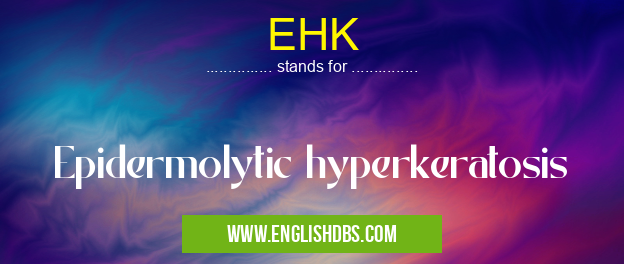What does EHK mean in MEDICAL
Epidermolytic hyperkeratosis (EHK) is a form of chronic skin disorder in which the patient develops excess layers of thick, scaly skin. It is caused by a genetic mutation that affects the structural protein keratin in the outer layer of the skin. As a result, instead of forming tightly bundled bundles of protein, keratin proteins are released into the upper layers and accumulate over time leading to dryness, itching, and scaling. EHK most commonly affects areas such as the arms, legs, and trunk but can also affect other areas occasionally.

EHK meaning in Medical in Medical
EHK mostly used in an acronym Medical in Category Medical that means Epidermolytic hyperkeratosis
Shorthand: EHK,
Full Form: Epidermolytic hyperkeratosis
For more information of "Epidermolytic hyperkeratosis", see the section below.
Symptoms
Patients with EHK often experience redness or inflammation in their affected area along with small white bumps that can feel raised to the touch. In some cases, blisters may form if not treated properly. Patients may also experience itching and/or burning sensations as well as pain or discomfort in their affected area due to dryness or tightness from the accumulation of protein buildup.
Treatment Options
Treatment for EHK typically consists of topical creams containing cortisone or vitamin A derivatives to reduce inflammation and reduce itchiness. Other topical treatments such as retinoids may be used to minimize scaling while other medications such as antibiotics or antifungals can also be prescribed to help manage infection if present. In more severe cases where topical treatment fails to provide adequate relief, light therapy using laser or phototherapy may be required to further reduce symptoms.
Essential Questions and Answers on Epidermolytic hyperkeratosis in "MEDICAL»MEDICAL"
What is epidermolytic hyperkeratosis?
Epidermolytic hyperkeratosis is a rare inherited skin condition characterized by thickening and hardening of the outer layer of the skin, as well as blistering. It typically appears as scaly, red patches that may be painful or itchy.
What causes epidermolytic hyperkeratosis?
Epidermolytic hyperkeratosis is caused by a genetic mutation in specific genes that are responsible for making proteins which help form an intact skin barrier. The exact cause of the genetic mutation is not known.
Are there any complications associated with epidermolytic hyperkeratosis?
Yes, some people with epidermolytic hyperkeratosis may have related complications such as vision problems, joint stiffness, and problems breathing due to facial swelling.
Who is at risk for developing epidermolytic hyperkeratosis?
Epidermolytic hyperkeratosis is an inherited disorder, so anyone who has a parent or grandparent with the condition has an increased risk of developing it themselves. Additionally, individuals with weakened immune systems are also more likely to be affected.
What are the symptoms of epidermolytic hyperkeratosis?
Symptoms of epidermolytic hyperkeratosis can vary from person to person but generally include scaly red patches on the skin that are thickened and hardened; itchy or painful sores; blisters; and excessive dryness or oiliness in certain areas of the skin.
How is epidermolytic hyperkeratosis diagnosed?
Diagnosing epidermolytic hyperkeratosis typically requires physical examination of the affected areas and a review of family medical history. Additional tests including biopsies or gene testing may also be required for definitive diagnosis in more difficult cases.
Is there a cure for epidermolytic hyperkeratosis?
Unfortunately there is no cure for epidermolytic hyperkeratosis since it’s a genetic disorder that cannot be reversed at this time. However, there are treatments available to manage symptoms and improve quality of life.
What treatments are available for epidermolytichyperkeratoisis?
Treatment options vary depending on the severityof symptoms but may include topical steroids orother medications to reduce inflammation andreduce itchiness; avoidance of irritating substancesand activities that may worsen symptoms; moisturizersand lubricants to protect against infection invulnerable areas; antibiotics or antiviral drugs if necessaryto treat secondary infections; phototherapy tobenefit from light therapy; surgical procedures toremove dead tissue around lesions; and in extremecases, stem cell therapy may be used in combinationwith other therapies to improve healing times.
Is it possible to preventepidermolytichyperkeratroisisif someone has a family historyof it?
As this condition is not caused by anything externalbut rather due to genetic predisposition it can not bedirectly prevented although practicing good skincare habitsmay help reduce symptoms in those alreadyaffected by this condition. Additionally, due itshereditary nature, individuals with a family historyshould consider talking with their doctor aboutpotential risks and means of prevention.
Can pregnant women safely use medications prescribedfor treatingepidemiodlytichyperkaraterorisnontheirbaby?
Most medications used for treating thiscondition are considered safe during pregnancyhowever expectant mothers should always consultwith their obstetrician before taking any kindof medication while expecting as certain drugsmay have adverse side effects on both mother andchild.
Final Words:
Epidermolytic hyperkeratosis (EHK) is a chronic skin disorder characterized by thickened scaly skin caused by abnormal production of keratin proteins in the outer layer of skin. Symptoms include redness, scaling, itching, burning sensations, tightness due to dryness and pain or discomfort. Treatment usually involves topical medications but may require light therapy if other methods fail to adequately relieve symptoms. With proper diagnosis and treatment however patients suffering from EHK can expect long-term relief from this condition.
